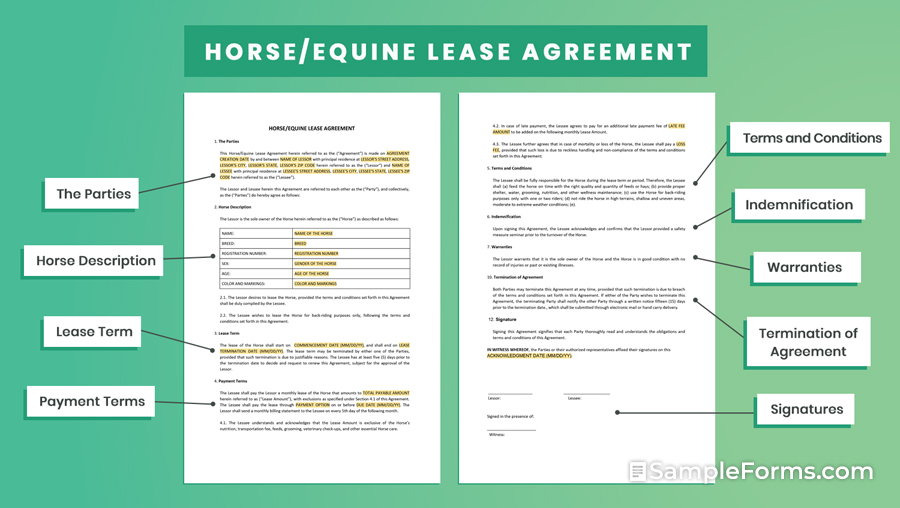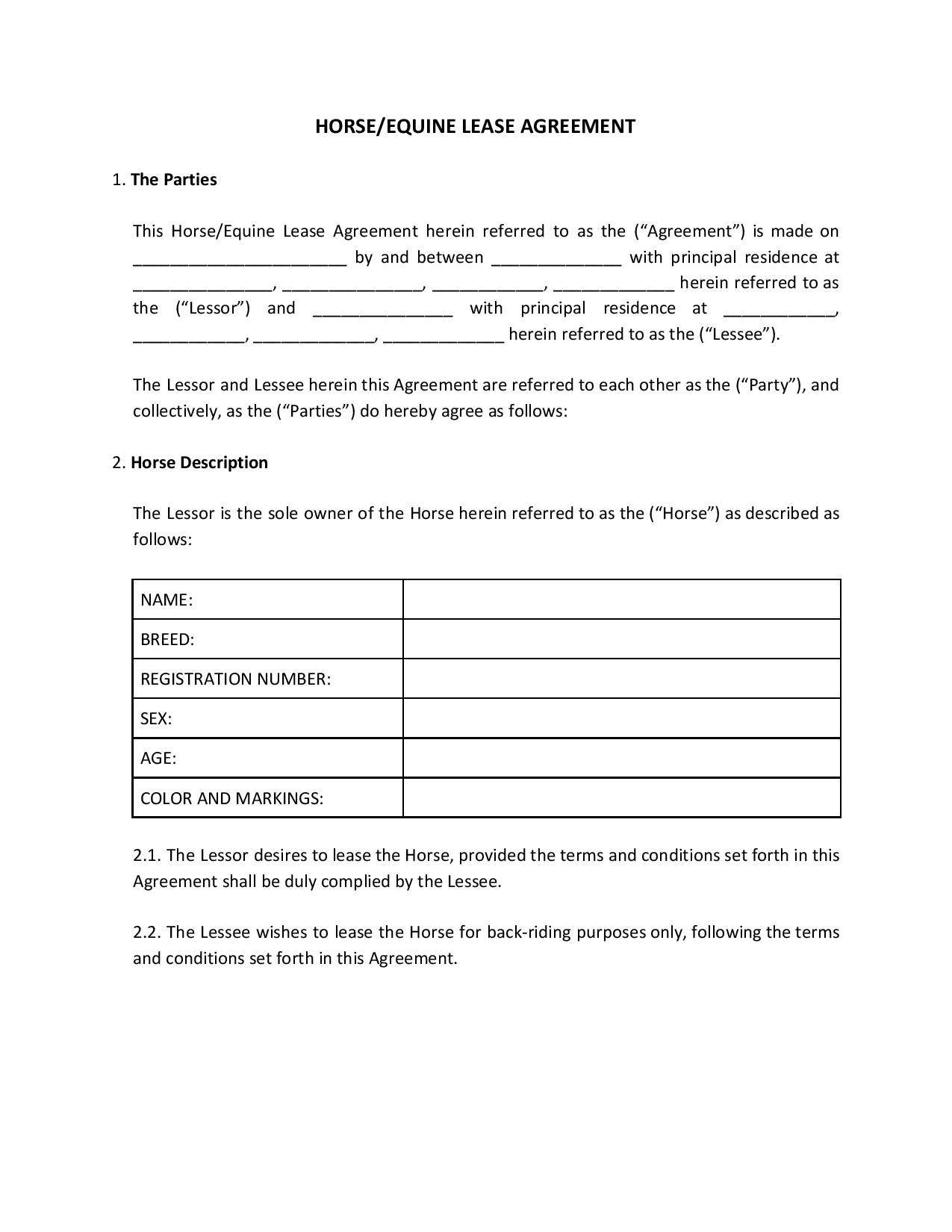- Eviction Notice Forms
- Power of Attorney Forms Forms
- Bill of Sale (Purchase Agreement) Forms
- Lease Agreement Forms
- Rental Application Forms
- Living Will Forms Forms
- Recommendation Letters Forms
- Resignation Letters Forms
- Release of Liability Agreement Forms
- Promissory Note Forms
- LLC Operating Agreement Forms
- Deed of Sale Forms
- Consent Form Forms
- Support Affidavit Forms
- Paternity Affidavit Forms
- Marital Affidavit Forms
- Financial Affidavit Forms
- Residential Affidavit Forms
- Affidavit of Identity Forms
- Affidavit of Title Forms
- Employment Affidavit Forms
- Affidavit of Loss Forms
- Gift Affidavit Forms
- Small Estate Affidavit Forms
- Service Affidavit Forms
- Heirship Affidavit Forms
- Survivorship Affidavit Forms
- Desistance Affidavit Forms
- Discrepancy Affidavit Forms
- Career Assessment - 16+ Examples, Format, Tips, Pdf Forms
- Undertaking Affidavit Forms
- General Affidavit Forms
- Affidavit of Death Forms
Horse/Equine Lease Agreement
From the absence of innovation in the olden times, horses have been the means of transportation, hunting, and wars for the local folks. Now, more than ever, they still serve great purposes in the ranch, polo fields, and many more. If you want to have your horse rented, it might be a good idea to start with a horse/equine lease agreement. This agreement will help protect you and your asset. So, read below to find more about this type of agreement. Read More
Horse/Equine Lease Agreement
What Is a Horse/Equine Lease Agreement?

Just like a horse/equine bill of sale, a horse/equine lease agreement is a legal document between the Lessor and the Lessee regarding the lease of a horse or equine. The agreement discusses whether the Lessee is responsible for the horse’s care on top of the lease fee or whether the Lessor handles the horse’s care while the Lessee takes care of the lease fee.
How to Write a Horse/Equine Lease Agreement?
According to the Equine Heritage Institute, the United States has about 9.5 million horses—that makes it the country with the most number of horses. While the U.S. has the most number of horses, Rwanda and St. Helena have no reported horses. We have gathered every informative tip for you on how to create a horse/equine lease agreement. Continue reading below to know what these are.
1. Identify Both Parties
Always identify both parties at the start of each agreement. Identify who is the Lessor and who is the Lessee and also include their residential or mailing addresses. Use official documents or identification cards to certify the identity of the Lessee.
2. Regulate the Lease Term
How long is the lease valid? For six months? For one year? Specify the starting and ending dates in your standard rental lease agreement and provide an option to renew if you are planning to renew the lease once the agreement is terminated.
3. Include Terms and Conditions
The welfare of the horse or equine is the top priority for horse enthusiasts. Therefore, you should set the same standards, if not higher, to your Lessee on how your horse will be treated. Questions like “Who should I allow to ride the horse?”, “What type of care should the horse get?” “What types of riding are allowed?” and so on. You should expect the same treatment from your Lessee as if the horse is still in your care. State your conditions explicitly as well as limitations and the responsibilities of the Lessee under this provision.
4. Discuss the Rent and Related Fees
How much should the Lessee pay, and when is it due? Will the Lessee be responsible for the horse’s care and maintenance and the monthly rent? Or will the Lessee be responsible for the monthly rent alone? Again, indicate the due date and the amount of the monthly rent and which of the two parties would handle the horse care expenses. Also, the types of payment available should be under this provision.
5. Cover the Indemnification and Risk Acceptance
Indemnification is where the Lessee agrees to shoulder any financial responsibility or liability caused by the animal. For instance, if the animal damages a portion of the fencing in a ranch, then the Lessee shall pay the damages, not the Lessor. Whereas risk acceptance refers to the Lessee embracing or accepting all potential risks, injuries, and mortality that comes with horse riding and that the Lessor shall not pay for the said risks, damages, and mortality.
Afterward, include a termination clause to settle renewal, termination, or lease extension then seal the deal with both parties’ signatures. A notary public’s signature may or may not be required in your State, but you should include it, just to be safe. So, sign the document in the presence of the notary public and your witnesses.
Frequently Asked Questions
What do you mean by a partial horse lease?
According to Horse and Rider, a partial horse lease means that the Lessor splits the riding time and care expenses with the Lessee.
What is the purpose of a horse/equine lease agreement?
The purpose of a horse/equine lease agreement is to lease the horse by the Lessor to the Lessee under a set of terms and conditions. The most important provisions tackled here are the parties, payments and fees, the horse’s description, and the horse’s care and maintenance.
How can I lease my horse?
You can lease your horse by planning on the month to month lease, the lease term, the rider requirements, and the Lessee’s responsibilities and limitations. Afterward, you may create a horse/equine lease agreement that entails this information.
Should I lease or buy a horse?
According to Plaid Horse, leasing a horse is more affordable than buying one. However, if you buy a horse, and eventually decide to sell it, the selling price will be lower compared to the purchase price. Or if you are unlucky, the horse may continue to have increased vet and horse boarding fees.
Do I have the legal obligation to provide a lease renewal?
No. As a landlord, the option to provide a lease renewal entirely depends on you. You may or may not offer a lease renewal to the Lessee.
Horses are multifaceted animals—they are an alternative to cars, they can assist you with your chores, and riding them can be one priceless hobby. They can serve their purpose honestly well as long as their basic needs are met and are well taken care of. In short, they need the utmost attention and care from a dedicated horse rider. So, when the time comes that you need to lease your horse for particular reasons, bring out a horse/equine lease agreement.
